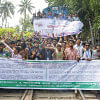How corruption is perpetuated across generations in Bangladesh

On January 31, Transparency International (TI) released its Corruption Perceptions Index 2022, and Bangladesh earned the 12th global lowest position. Keeping up with the worldwide trend, the overall situation in Bangladesh appears to have worsened compared to previous years.
Speaking from my personal experiences as a young adult growing up in Bangladesh, I find that there is little discourse around how the prevalence of corruption in our society is shaping the youth, the people who will go on to take charge in the future. This is not surprising in a country where adolescents are generally discouraged from thinking about politics and social issues, because these supposedly only concern adults.
Yet, there is no doubt that the misuse of power by authoritative bodies has an impact on the country's younger demographic in important sectors of their lives such as education and healthcare. The most recent example of this is a headmaster in Patuakhali who had been letting his brother occupy the school playground to run his contracting business, thus depriving students of school resources that are meant for their use.
Young people like me have grown up seeing how common it is to give or take bribes, where it has become the norm, sometimes even a necessary step to secure services that were supposed to be free in the first place. We see instances of embezzlement or nepotism, like the one in Patuakhali, being reported on the news daily.
The perception is such that high profile individuals in the most coveted positions, with the most money and influence, are the most corrupt. Young adults are expected to aspire to join these elite groups of the rich and powerful.
The irony is that the culture of corruption is so widespread now that it has infiltrated our schools and universities, the very establishments that are supposed to teach us about ethics and our duty to be law-abiding citizens. Even in our homes, we seldom get those teachings, because our loved ones are often actively partaking in this culture.
So, in a way, aren't we enabling a society where the best our newer generations can hope for is to end up on the side of the bribe-takers, or otherwise fall victim to the same corruption? In order to dismantle this broken system for good, there is a need to assess how young people are interacting with it.
Economists agree that rampant corruption is one of the main factors holding down the country's GDP growth rate. Extensive anti-corruption measures are the only way to curb this national crisis we are currently faced with.
At the same time, including the youth perspective in public dialogues surrounding corruption is very important. We are sick of never being heard while we silently suffer the consequences of a dysfunctional system we never helped to create, and if this is the legacy our predecessors are leaving behind, don't blame us for wanting nothing to do with it.
References:
1. The Daily Star (February 5, 2023). School field under clutches of headmaster's brother's business operations.
2. The Daily Star (February 1, 2023). CPI 2022: Disappointing global and Bangladesh performances.
Nahian is the friend that initiates group hugs. Find her at [email protected]

 For all latest news, follow The Daily Star's Google News channel.
For all latest news, follow The Daily Star's Google News channel. 








Comments